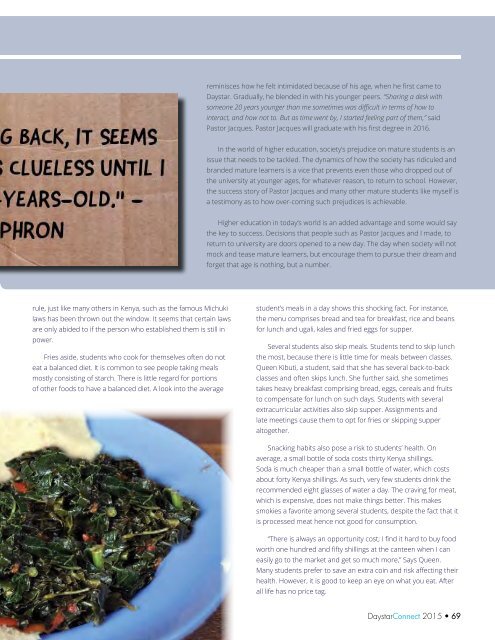our roots
Connect2015
Connect2015
You also want an ePaper? Increase the reach of your titles
YUMPU automatically turns print PDFs into web optimized ePapers that Google loves.
eminisces how he felt intimidated because of his age, when he first came to<br />
Daystar. Gradually, he blended in with his younger peers. “Sharing a desk with<br />
someone 20 years younger than me sometimes was difficult in terms of how to<br />
interact, and how not to. But as time went by, I started feeling part of them,” said<br />
Pastor Jacques. Pastor Jacques will graduate with his first degree in 2016.<br />
In the world of higher education, society’s prejudice on mature students is an<br />
issue that needs to be tackled. The dynamics of how the society has ridiculed and<br />
branded mature learners is a vice that prevents even those who dropped out of<br />
the university at younger ages, for whatever reason, to return to school. However,<br />
the success story of Pastor Jacques and many other mature students like myself is<br />
a testimony as to how over-coming such prejudices is achievable.<br />
Higher education in today’s world is an added advantage and some would say<br />
the key to success. Decisions that people such as Pastor Jacques and I made, to<br />
return to university are doors opened to a new day. The day when society will not<br />
mock and tease mature learners, but enc<strong>our</strong>age them to pursue their dream and<br />
forget that age is nothing, but a number.<br />
rule, just like many others in Kenya, such as the famous Michuki<br />
laws has been thrown out the window. It seems that certain laws<br />
are only abided to if the person who established them is still in<br />
power.<br />
Fries aside, students who cook for themselves often do not<br />
eat a balanced diet. It is common to see people taking meals<br />
mostly consisting of starch. There is little regard for portions<br />
of other foods to have a balanced diet. A look into the average<br />
student’s meals in a day shows this shocking fact. For instance,<br />
the menu comprises bread and tea for breakfast, rice and beans<br />
for lunch and ugali, kales and fried eggs for supper.<br />
Several students also skip meals. Students tend to skip lunch<br />
the most, because there is little time for meals between classes.<br />
Queen Kibuti, a student, said that she has several back-to-back<br />
classes and often skips lunch. She further said, she sometimes<br />
takes heavy breakfast comprising bread, eggs, cereals and fruits<br />
to compensate for lunch on such days. Students with several<br />
extracurricular activities also skip supper. Assignments and<br />
late meetings cause them to opt for fries or skipping supper<br />
altogether.<br />
Snacking habits also pose a risk to students’ health. On<br />
average, a small bottle of soda costs thirty Kenya shillings.<br />
Soda is much cheaper than a small bottle of water, which costs<br />
about forty Kenya shillings. As such, very few students drink the<br />
recommended eight glasses of water a day. The craving for meat,<br />
which is expensive, does not make things better. This makes<br />
smokies a favorite among several students, despite the fact that it<br />
is processed meat hence not good for consumption.<br />
“There is always an opportunity cost; I find it hard to buy food<br />
worth one hundred and fifty shillings at the canteen when I can<br />
easily go to the market and get so much more,” Says Queen.<br />
Many students prefer to save an extra coin and risk affecting their<br />
health. However, it is good to keep an eye on what you eat. After<br />
all life has no price tag.<br />
DaystarConnect 2015 • 69


